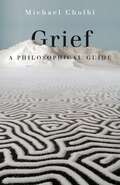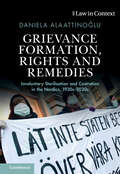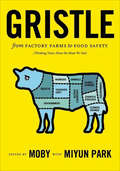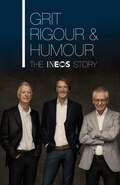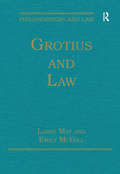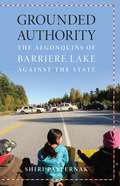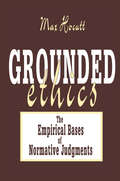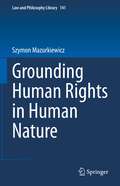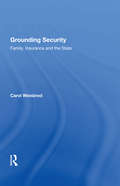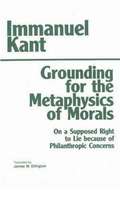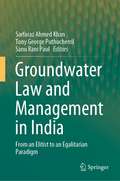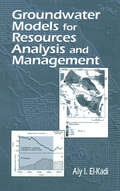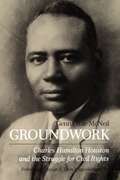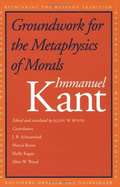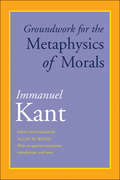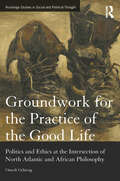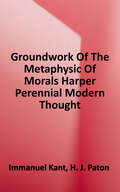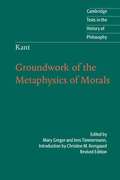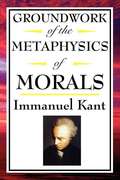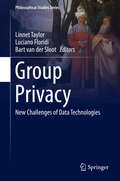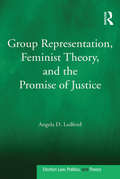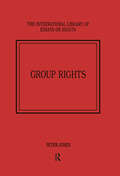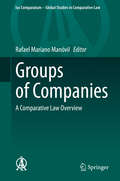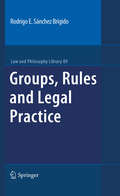- Table View
- List View
Grey Seas Under
by Farley MowatThis is the story of the foundation Franklin, an ocean salvage vessel that operated during the 1930s and 40s. Here we see fires, collisions, groundings and fires. Here we meet the heroic men who battle the sea at it's worst. If you like true action adventures, you'll like this book.
Grief: A Philosophical Guide
by Michael CholbiAn engaging and illuminating exploration of grief—and why, despite its intense pain, it can also help us growExperiencing grief at the death of a person we love or who matters to us—as universal as it is painful—is central to the human condition. Surprisingly, however, philosophers have rarely examined grief in any depth. In Grief, Michael Cholbi presents a groundbreaking philosophical exploration of this complex emotional event, offering valuable new insights about what grief is, whom we grieve, and how grief can ultimately lead us to a richer self-understanding and a fuller realization of our humanity.Drawing on psychology, social science, and literature as well as philosophy, Cholbi explains that we grieve for the loss of those in whom our identities are invested, including people we don't know personally but cherish anyway, such as public figures. Their deaths not only deprive us of worthwhile experiences; they also disrupt our commitments and values. Yet grief is something we should embrace rather than avoid, an important part of a good and meaningful life. The key to understanding this paradox, Cholbi says, is that grief offers us a unique and powerful opportunity to grow in self-knowledge by fashioning a new identity. Although grief can be tumultuous and disorienting, it also reflects our distinctly human capacity to rationally adapt as the relationships we depend on evolve.An original account of how grieving works and why it is so important, Grief shows how the pain of this experience gives us a chance to deepen our relationships with others and ourselves.
Grievance Formation, Rights and Remedies: Involuntary Sterilisation and Castration in the Nordics, 1930s–2020s (Law in Context)
by Daniela AlaattinoğluIn the last century, the treatment of victims of involuntary sterilisation and castration in Nordic countries has varied drastically from state-to-state, across time and victim groups. Considering why this is the case, Daniela Alaattinoğlu investigates how laws and practices of involuntary, surgical sterilisation and castration have been established, abolished and remedied in three Nordic states: Sweden, Norway and Finland. Employing a vast range of primary and secondary sources, Alaattinoğlu traces the national and international developments of the last 100 years. Developing the concept of grievance formation, the book explores why some states have claimed public responsibility while others have not, and why some victim groups have mobilised while others have remained silent. Through this pioneering analysis, Alaattinoğlu illuminates issues of human and constitutional rights, the evolution of the welfare state and state responsibility in both a national and global context.
Gristle: From Factory Farms to Food Safety
by Miyun ParkThe musician and activist offers &“a collection of compelling, well-researched essays . . . shining light on the world of agribusiness&” and Big Meat (Publishers Weekly). For everyone from omnivores to vegans, this eye-opening guide offers food for thought on today&’s meat industry. Moby, renowned musician and passionate vegan, and Miyun Park, leading food policy activist, bring together experts from diverse backgrounds including: farming, workers&’ rights activism, professional athletics, science, environmental sustainability, food business, and animal welfare advocacy. Together, they eloquently lay out how industrial animal agriculture unnecessarily harms workers, communities, the environment, our health, our wallets, and animals. In the tradition of Michael Pollan&’s The Omnivore&’s Dilemma, Gristle combines hard-hitting facts with a light touch and includes informative charts and illustrations depicting the stark realities of America&’s industrial food system. Contributors include: Brendan BrazierLauren BushChristine Chavez and Julie Chavez RodriguezMichael Greger, MDSara Kubersky and Tom O&’HaganFrances Moore Lappé and Anna LappéJohn MackeyDanielle Nierenberg and Meredith NilesWayne PacellePaul and Phyllis Willis
Grit, Rigour & Humour: The INEOS Story
by Patrick Barclay Andrew Likierman Sebastian Coe Sir Jim Ratcliffe Dominic O'Connell Quentin Willson Sean Keach Steph McGovern'Manual for success' The AthleticWith an opening chapter by Sir Jim RatcliffeTo mark the 25th Anniversary of the founding of INEOS in 1998, seven leading specialist authors explore the main strands of INEOS's business, including its core chemical business to its ventures into sport, automotive, consumer goods, sustainability, next generation and philanthropy.* Dominic O'Connell on INEOS' core petrochemicals and energy business* Patrick Barclay on INEOS's involvement in sport from the America's Cup to cycling, athletics to Formula 1 and football* Quentin Willson on the building of the Grenadier from scratch in response to the demise of the Land Rover Defender* Steph McGovern on INEOS' move into the consumer goods sector with brands such as Belstaff and INEOS Hygienics, so vital during the pandemic* Sean Keach on INEOS' journey to Net Zero and sustainable investment* Lord Sebastian Coe on the vital importance of exercise for the next generation, with a particular focus on INEOS's worldwide children's exercise initiative, 'The Daily Mile', and the 'Forgotten 40', the 40% of the UK's young who are affected by a lack of basic resources to remain fit and healthy* Sir Andrew Likierman on INEOS' philanthropic projects and investmentsGrit, Rigour & Humour offers an extraordinary and balanced insight into the rise of one of the world's most successful companies, which produces the essential building blocks used in most of the products you use daily from medical products and packaging to electronics and transport, and has expanded rapidly over the past decade into one with interests in many diverse walks of life.
Grotius and Law (Philosophers And Law Ser.)
by Emily McGillThe essays collected for this volume represent the best scholarly literature on Hugo Grotius available in the English language. In the English speaking world Grotius is not as well known as his fellow 17th century political philosophers, Thomas Hobbes or John Locke, but in legal theory Grotius is at least as important. Even on central political concepts such as liberty and property, Grotius has important views that should be explored by anyone working in legal and political philosophy. And Grotius�s work, especially De Jure Belli ac Pacis, is much more important in international law and the laws of war than anyone else�s work in the 17th or 18th centuries. This volume is therefore useful not only to Grotius scholars, but also to anyone interested in historical and modern debates on key issues in political and legal philosophy more broadly, and international law in particular.
Grounded Authority: The Algonquins of Barriere Lake against the State (Indigenous Americas)
by Shiri PasternakWestern Political Science Association's Clay Morgan Award for Best Book in Environmental Political Theory Canadian Studies Network Prize for the Best Book in Canadian Studies Nominated for Best First Book Award at NAISA Honorable Mention: Association for Political and Legal Anthropology Book Prize Since Justin Trudeau&’s election in 2015, Canada has been hailed internationally as embarking on a truly progressive, post-postcolonial era—including an improved relationship between the state and its Indigenous peoples. Shiri Pasternak corrects this misconception, showing that colonialism is very much alive in Canada. From the perspective of Indigenous law and jurisdiction, she tells the story of the Algonquins of Barriere Lake, in western Quebec, and their tireless resistance to federal land claims policy. Grounded Authority chronicles the band&’s ongoing attempts to restore full governance over its lands and natural resources through an agreement signed by settler governments almost three decades ago—an agreement the state refuses to fully implement. Pasternak argues that the state&’s aversion to recognizing Algonquin jurisdiction stems from its goal of perfecting its sovereignty by replacing the inherent jurisdiction of Indigenous peoples with its own, delegated authority. From police brutality and fabricated sexual abuse cases to an intervention into and overthrow of a customary government, Pasternak provides a compelling, richly detailed account of rarely documented coercive mechanisms employed to force Indigenous communities into compliance with federal policy.A rigorous account of the incredible struggle fought by the Algonquins to maintain responsibility over their territory, Grounded Authority provides a powerful alternative model to one nation&’s land claims policy and a vital contribution to current debates in the study of colonialism and Indigenous peoples in North America and globally.
Grounded Ethics: The Empirical Bases of Normative Judgements
by Max HocuttScientific naturalism--basing beliefs on empirical evidence--has now triumphed in every field of inquiry except moral philosophy. There it is still thought appropriate to cite otherworldly standards known by divine revelation or moral intuition. In Grounded Ethics Max Hocutt argues that, since there is no transcendent reality on which to base the claims of ethics, normative truth must be sought in the desires of individuals and the conventions of societies.Hocutt begins with an empiricist analysis of normative judgments. Following B.F. Skinner, he asserts that we call good what reinforces our desires, and that we call right or just what we desire to reinforce. Consequently, desire is the immediate measure of both goodness and justice. Acknowledging that goodness is relative to individual preferences, and justice is relative to social norms, Hocutt denies that goodness is a matter of personal opinion and that every society's institutions are as good as every other's. Instead, he says, the conduct of individuals and the customs of societies must ultimately be evaluated by how well they serve biologically based needs. These must be discovered empirically, because they cannot be known a priori.In support of this analysis, Hocutt challenges rationalist belief, that normative concepts cannot be defined in empirical terms because they are rooted in divine law or ideals of pure reason. Against this view, Hocutt argues that if the moral law exists only as an ideal, it is not binding in the same sense as the empirically known laws and moralities of actual societies. He also points out that rationalist intuitions are best understood as expressions of animal instinct, socially conditioned prejudice, and personal preference. In addition, he offers extensive critiques of major philosophers, both ancient and modern, who hold contrary views.All of this is meant to show that there is no escaping the empirical: A sensible ethics must be built on observable facts; it cannot be pulled from a vague but pious rationalist sky. Hocutt's demonstration of this thesis will interest philosophers, behavioral biologists, sociologists and ethicists.
Grounding Human Rights in Human Nature (Law and Philosophy Library #142)
by Szymon MazurkiewiczWhat does it mean that human rights derive from human dignity? And what is the foundation of human dignity? How are human dignity and its foundation connected? Is the recent development of natural sciences dealing with human nature, like evolutionary psychology, relevant to these questions? The book addresses these points by connecting the discussion on the foundations of human rights with the recent claims regarding human nature made in evolutionary psychology, and with contemporary analytic metaphysics, especially the relation of metaphysical grounding. It offers in-depth insights into the so-called naturalistic approach to human rights, together with detailed proposals on how the approach could be truly naturalized in the philosophical sense. It shows how human rights and human dignity may have foundations in natural facts about human nature and offers a detailed analysis of how the “is” / “ought” gap problematic can be solved.The book also addresses the objection of Western ethnocentrism – unlike most of the contemporary philosophical accounts of human rights, which draw on highly individualistic Western concepts, it employs concepts like altruism and cooperation.
Grounding Security: Family, Insurance and the State (Law, Justice And Power Ser.)
by Carol WeisbrodThis book examines some of the mechanisms which are currently conceived as affording individual security. The idea of security includes emotional and financial components. These interconnect so that such common concepts as 'trust' in someone and 'care taking' include both ideas of emotional and financial support. State policies on security rest on perceptions of two other institutions, the family and insurance, both of which are subject to change. At one time the extended family was seen as a major security-providing institution, but the contemporary nuclear family is more fragile. The concept of insurance originally entailed ideas of community and mutual aid; however, the institution has developed, in its modern private form, as a profit-driven entity. This book addresses various uses of state power in providing security for individuals, and outlines different ways in which this can be done.
Grounding for the Metaphysics of Morals: with, On a Supposed Right to Lie Because of Philanthropic Concerns
by Immanuel Kant James W. EllingtonTranslation of: Grundlegung zur Metaphysik der Sitten: and of: Uber ein vermeintes Recht aus Menschenliebe zu lugen. This is the third edition of this volume.
Groundwater Law and Management in India: From an Elitist to an Egalitarian Paradigm
by Sarfaraz Ahmed Khan Tony George Puthucherril Sanu Rani PaulThis book presents a comprehensive analysis of the existing nature of India’s groundwater laws. In the backdrop of the gravity of groundwater crisis that threatens to engulf the country, the book examines the correlation between the imperfections in the law and water crisis and advocates a reform agenda to overhaul the legal framework. It accomplishes this objective by examining how some of the States and Union Territories regulate and manage groundwater through the legal instrumentality against the backdrop of the two conflicting paradigms: the “elitist” and the “egalitarian.” The book’s fundamental premise is that despite being an extraordinarily critical resource that supports India’s burgeoning population’s ever-increasing water demands, groundwater is abused and mismanaged. The key argument that it posits is that the elitist paradigm must give way to an egalitarian one where groundwater is treated as a common property resource. To place this message in perspective, the book’s introduction explains the dichotomy between the two paradigms in the context of groundwater. This sets the stage, after which the book is divided thematically into three parts. The first part deals with some of the general groundwater management concerns brought to the fore by the operation of the elitist paradigm. Since water is constitutionally a State subject, the second part analyses the groundwater legislations of different States and Union Territories set against their unique circumstances. As these laws do not dismantle the elitist paradigm that interlocks groundwater rights to land rights, the next part articulates the legal reform agenda where a case is made to re-engineer groundwater laws to reflect a more sustainable basis. The findings and arguments resonate with the situation in many developing countries around the world due to which the book is a valuable resource for researchers across disciplines studying this area, and also for policy makers, think tanks, and NGOs.Groundwater Management–Inter-state Water Conflicts–Aquifers–Water Markets–Water Security–Water Law Reform–Groundwater Law–Water Law–Sustainable Development–Hydrology
Groundwater Models for Resources Analysis and Management
by Aly I. El-KadiWritten by renowned experts in the field, this book assesses the status of groundwater models and defines models and modeling needs in the 21st century. It reviews the state of the art in model development and application in regional groundwater management, unsaturated flow/multiphase flow and transport, island modeling, biological and virus transport, and fracture flow. Both deterministic and stochastic aspects of unsaturated flow and transport are covered. The book also introduces a unique assessment of models as analysis and management tools for groundwater resources. Topics covered include model vs. data uncertainty, accuracy of the dispersion/convection equation, protocols for model testing and validation, post-audit studies, and applying models to karst aquifers.
Groundwork
by Genna Rae Mcneil A. Leon Higginbotham Jr."A classic. . . . [It] will make an extraordinary contribution to the improvement of race relations and the understanding of race and the American legal process."--Judge A. Leon Higginbotham, Jr., from the ForewordCharles Hamilton Houston (1895-1950) left an indelible mark on American law and society. A brilliant lawyer and educator, he laid much of the legal foundation for the landmark civil rights decisions of the 1950s and 1960s. Many of the lawyers who won the greatest advances for civil rights in the courts, Justice Thurgood Marshall among them, were trained by Houston in his capacity as dean of the Howard University Law School. Politically Houston realized that blacks needed to develop their racial identity and also to recognize the class dimension inherent in their struggle for full civil rights as Americans.Genna Rae McNeil is thorough and passionate in her treatment of Houston, evoking a rich family tradition as well as the courage, genius, and tenacity of a man largely responsible for the acts of "simple justice" that changed the course of American life.
Groundwork for the Metaphysics of Morals
by Immanuel Kant Allen W. WoodKant sets out to articulate and defend the Categorical Imperative - the fundamental principle that underlies moral reasoning - and to lay the foundation for a comprehensive account of justice and human virtues. This new edition and translation of Kant's work is designed especially for students. An extensive and comprehensive introduction explains the central concepts of Groundwork and looks at Kant's main lines of argument. Detailed notes aim to clarify Kant's thoughts and to correct some common misunderstandings of his doctrines.
Groundwork for the Metaphysics of Morals: With an Updated Translation, Introduction, and Notes (Oxford Philosophical Texts)
by Immanuel Kant Allen W. WoodNow in a new, affordable edition with updated notes, a superbly readable translation of Kant’s classic work This work, one of the most important texts in the history of ethics, presents Immanuel Kant’s conception of moral self-government based on pure reason. It has been a source of controversy and an object of reinterpretation for over two centuries. This new edition of Kant’s work provides a fresh translation that is uniquely faithful to the German original and more fully annotated than any previous translation. The editor and translator, Allen Wood, has written a new introduction.
Groundwork for the Practice of the Good Life: Politics and Ethics at the Intersection of North Atlantic and African Philosophy (Routledge Studies in Social and Political Thought)
by Omedi OchiengWhat makes for good societies and good lives in a global world? In this landmark work of political and ethical philosophy, Omedi Ochieng offers a radical reassessment of a millennia-old question. He does so by offering a stringent critique of both North Atlantic and African philosophical traditions, which he argues unfold visions of the good life that are characterized by idealism, moralism, and parochialism. But rather than simply opposing these flawed visions of the good life with his own set of alternative prescriptions, Ochieng argues that it is critically important to step back and understand the stakes of the question. Those stakes, he suggests, are to be found only through a social ontology – a comprehensive and in-depth account of the political, economic, and cultural structures that mark the boundaries and limits of life in the twenty-first century. It is only in light of this social ontology that Ochieng then proffers an alternative normative account of the good society and the good life – which he spells out as emergent from ecological embeddedness; social entanglement; embodied encounter; and aesthetic engenderment. At once sweeping and rigorous, incisive and subtle, original and revisionary, this book does more than just appeal to intellectuals and scholars across the humanities and social sciences – rather, it opens up the academic disciplines to a whole new landscape of exploration into the biggest and most pressing questions animating the human experience.
Groundwork of the Metaphysic of Morals (Harper Perennial Modern Thought Ser.)
by Immanuel KantThe finest single-volume introduction to Kant's ethics available in English. —Philosophical Review, on the H. J. Paton translation Considered one of the most profound, influential, and important works of world philosophy, Groundwork of the Metaphysic of Morals introduces his famous Categorical Imperative and lays down a foundation for all of Immanuel Kant's writings. In it, Kant illuminates the basic concept that is central to his moral philosophy and, in fact, to the entire field of modern ethical thought: The Categorical Imperative, the supreme principle of morality, stating that all decisions should be made based on what is universally acceptable. Featuring the renowned translation and commentary of Oxford's H. J. Paton, this volume has long been considered the definitive English edition of Kant's classic text. "Kant's Groundwork of the Metaphysic of Morals," Paton writes in his preface, "is one of the small books which is truly great: it has exercised on human thought an influence almost ludicrously disproportionate to its size."
Groundwork of the Metaphysics of Morals
by Immanuel Kant Christine M. Korsgaard Jens Timmermann Mary GregorPublished in 1785, Immanuel Kant's Groundwork of the Metaphysics of Morals ranks alongside Plato's Republic and Aristotle's Nicomachean Ethics as one of the most profound and influential works in moral philosophy ever written. In Kant's own words, its aim is to identify and corroborate the supreme principle of morality, the categorical imperative. He argues that human beings are ends in themselves, never to be used by anyone merely as a means, and that universal and unconditional obligations must be understood as an expression of the human capacity for autonomy and self-governance. As such, they are laws of freedom. This volume contains Mary Gregor's acclaimed translation of the work, sympathetically revised by Jens Timmermann, and an accessible, updated introduction by Christine Korsgaard.
Groundwork of the Metaphysics of Morals
by Immanual KantKant's Groundwork of the Metaphysics of Morals is one of the most important works in modern moral philosophy. It belongs beside Plato, Aristotle, Machiavelli, and Hobbes. Here Kant sets out to articulate and defend the Categorical Imperative - the fundamental principle that underlies moral reasoning - and to lay the foundation for a comprehensive account of justice and human virtues.
Group Privacy
by Luciano Floridi Linnet Taylor Bart van der SlootThe goal of the book is to present the latest research on the new challenges of data technologies. It will offer an overview of the social, ethical and legal problems posed by group profiling, big data and predictive analysis and of the different approaches and methods that can be used to address them. In doing so, it will help the reader to gain a better grasp of the ethical and legal conundrums posed by group profiling. The volume first maps the current and emerging uses of new data technologies and clarifies the promises and dangers of group profiling in real life situations. It then balances this with an analysis of how far the current legal paradigm grants group rights to privacy and data protection, and discusses possible routes to addressing these problems. Finally, an afterword gathers the conclusions reached by the different authors and discuss future perspectives on regulating new data technologies.
Group Representation, Feminist Theory, and the Promise of Justice (Election Law, Politics, And Theory Ser.)
by Angela D. LedfordThere has been much important work done in the past two decades in America on issues of under representation based on social differences such as race, ethnicity, class, gender, sexuality, and age. While this scholarship has examined the ways in which women and racial, ethnic, and sexual minorities suffer disproportionately on measures of full citizenship, social class and culture have received relatively little attention. This new study addresses various manifestations of social class and cultural difference as well as their implications for political representation. The analysis demonstrates how three of the most influential feminist theorists who write about political representation conceive of group representation, identify the problems that group representation claims to remedy, and assess the strengths and weaknesses associated with these models. Using theoretical argument, the volume suggests practical electoral reform in order to encourage new and emancipating forms of political engagement. It will be of value to those interested in public policy and governance, political theory, gender studies and law and society in general.
Group Rights (The International Library of Essays on Rights)
by Peter JonesNowadays, rights are frequently ascribed to groups distinguished by their nationality, culture, religion or language. Rights are also commonly ascribed to institutionalised groups, such as states, businesses, trade unions and private associations. Yet the ascription of rights to groups remains deeply controversial. Many people reject the very idea of group rights. Amongst those who do not, there is radical disagreement about which sorts of group might possess rights and why. Some believe that group rights threaten the freedom and well-being of individuals, while others argue that the rights of groups can complement them. Some claim that group rights can also be human rights; others find that claim incoherent. The contributions making up this volume wrestle with these and many other of the issues that surround group rights. This volume brings together twenty-four of the journal articles that have contributed most significantly to contemporary thinking on group rights.
Groups of Companies: A Comparative Law Overview (Ius Comparatum - Global Studies in Comparative Law #43)
by Rafael Mariano ManóvilThis book presents a comprehensive study on how twenty-three countries have approached the issue of company groups. In addition to detailed profiles of each country’s legislation, written by some of the most respected experts in the field, the book also presents a general overview and offers readers an in-depth, up-to-date and highly practical comparative analysis of the company group phenomenon in connection with national legal regimes. As such, the book is a must-read for all those seeking a deeper understanding of how company groups are viewed and regulated around the globe.
Groups, Rules and Legal Practice
by Rodrigo Eduardo Sánchez BrigidoEver since Hart´s The Concept of Law, legal philosophers agree that the practice of law-applying officials is a fundamental aspect of law. Yet there is a huge disagreement on the nature of this practice. Is it a conventional practice? Is it like the practice that takes place, more generally, when there is a social rule in a group? Does it share the nature of collective intentional action? The book explores the main responses to these questions, and claims that they fail on two main counts: current theories do not explain officials´ beliefs that they are under a duty qua members of an institution, and they do not explain officials´ disagreement about the content of these institutional duties. Based on a particular theory of collective action, the author elaborates then an account of certain institutions, and claims that the practice is an institutional practice of sorts. This would explain officials´ beliefs in institutional duties, and officials´ disagreement about those duties. The book should be of interest to legal philosophers, but also to those concerned with group and social action theories and, more generally, with the nature of institutions.

